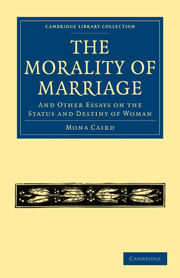PART I - EARLY HISTORY OF THE FAMILY
Published online by Cambridge University Press: 16 May 2011
Summary
“Ne retirons rien à l'esprit humain; supprimer est mauvais. Il faut reformer et transformer.”
—Victor Hugo.”'Tis inhuman to want faith in the power of education, since to meliorate is the law of nature.”
—Emerson.There is nothing that appears to be more trying to the “natural man” than to be asked to dethrone, for the moment, from his mind, the idols of that particular phase of society in which he lives, and to turn his eyes towards the great company of forgotten gods. It is so hard to realise that these grotesque images were, at one time, worshipped in fear and trembling, just as we now worship whatever image the power of the Age may have set up for our adoration. With our untutored ancestors, as with us, fear was the ruling motive of the worship; with them, as with us, sacrifice, human and animal, was the method of propitiation.
No doubt in all ages there has been a tendency to take the ruling ideas of the time as “natural” and eternal, and even to look upon social institutions as many of the Brazilian and Portuguese traders regard the Indian picture-writings on the granite rocks in the Amazon districts, as the works of God. On any objection being made to this theory, the triumphant question is returned, “And could not God make them?” which, as the narrator remarks, of course settles the point.
- Type
- Chapter
- Information
- The Morality of MarriageAnd Other Essays on the Status and Destiny of Woman, pp. 21 - 40Publisher: Cambridge University PressPrint publication year: 2010First published in: 1897



